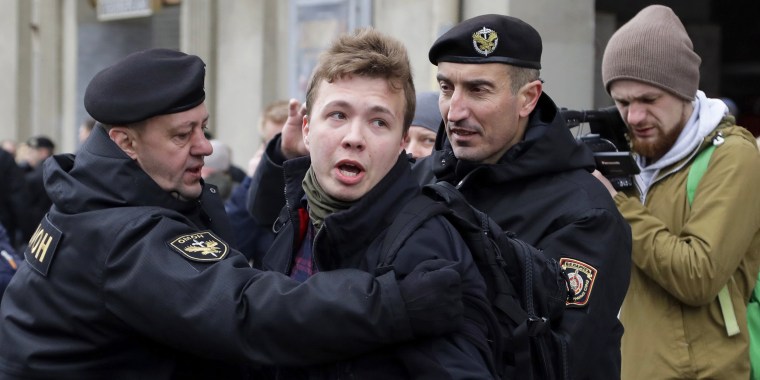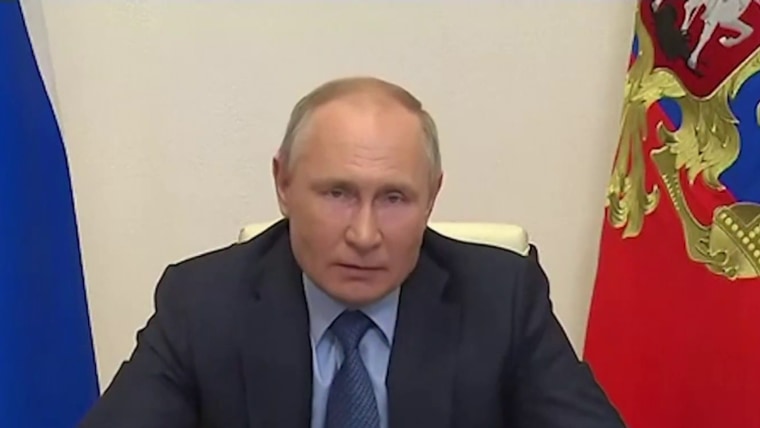Belarusian opposition leaders and rights groups on Friday called on the United States and its Western allies to put more pressure on Belarusian President Alexander Lukashenko, as they denounced an appearance by a detained journalist on state television as "ruthless propaganda."
Roman Protasevich, 26, said he had played a role in anti-government protests during a 90-minute interview aired late Thursday on the state-run ONT channel.
Appearing uncomfortable as he was grilled by a lone presenter, Protasevich, a former editor-in-chief of an anti-government channel on the secure messaging app Telegram known as Nexta — "someone" in Belarusian — said he was giving the interview of his own volition.
Protasevich also recanted his earlier criticism of Lukashenko, stating that he respected the leader who has been in power for 27 years.
At times tearful, he said that he had plotted to topple Lukashenko by organizing mass protests and that other opposition activists should call off their demonstrations.

Belarusian activists, many living in exile, said Protasevich seemed to have been coerced into the appearance and pointed to signs of injuries on his hands.
"This was not an interview. This was an interrogation," Franak Viacorka, a senior adviser to exiled opposition leader Sviatlana Tsikhanouskaya, told NBC News on Friday.
"The methods are from Stalin's time," he said, adding: "Unfortunately, we can't exclude that he was tortured, physically and psychologically ... We saw the signs of possible beatings and torture. His parents are sure that he was pressed to say what he said."
NBC News was unable to verify these claims, but authorities in the eastern European country have repeatedly been accused of torture and ill-treatment by rights groups like Amnesty International and the demonstrators themselves after mass protests broke out, following a disputed presidential election last August.
The Belarusian embassy in London did not immediately respond to a request for comment on the allegations about the Protasevich interview and the claims of violence against protesters, which authorities in the country have previously denied.
Protasevich made headlines around the world in May when a passenger jet he was traveling on was abruptly diverted by a fighter jet and forced to land in Belarus' capital, Minsk. Belarusian authorities forced the plane to land by flagging what turned out to be a false bomb alert.
He was subsequently arrested along with his Russian girlfriend, Sofia Sapega. Both have since appeared in videos, which have been criticized by their relatives as scripted.
Download the NBC News app for breaking news and politics
Tanya Lokshina, associate director for Human Rights Watch's Europe and Central Asia division, called Protasevich's latest interview "absolutely outrageous" and described it as "ruthless propaganda."
The detention and forced landing of the plane sparked fury from world leaders. The U.S. and European Union placed sanctions on a handful of Belarusian businesses and individuals as a result.
"Actions have consequences," Secretary of State Antony Blinken wrote Thursday on Twitter.
"As a result of the Lukashenka regime's continued disregard for human rights, the U.S. has terminated authorization for business dealings with nine Belarusian state-owned enterprises. The regime's escalation of repressive tactics will not go unanswered," he added, using an alternative spelling for Lukashenko.
European ambassadors on Friday also adopted a plan to ban Belarus carriers from flying over E.U. territory or landing in E.U. airports.

However, Tsikhanouskaya, who challenged Lukashenko in last year's election before she was forced to flee the country, called for more pressure from the U.S. and its allies.
"Roman is the regime's hostage. We, Belarusians, have to release him and thousands of other innocent people," she told NBC News on Friday.
"I call on the U.S. and the international community to promptly take tough, practical measures ... The reaction from the world must aim to address the crisis in its entirety or such incidents endangering international norms will happen again."
Lokshina, of Human Rights Watch, said Belarus was also relying on neighboring Russia for support, where President Vladimir Putin has championed Lukashenko. The pair met at the Black Sea resort of Sochi days after Protasevich's plane was grounded and Putin described Western criticism of the incident as "an outburst of emotion."
"It is pretty obvious that the reason Lukashenko is still able to get away with this is because of the support he's getting from Moscow, including financial support," Lokshina told NBC News.
However, for Jason Bush, a senior analyst at the Eurasia Group, a political risk consultancy, the connection between Russia and Belarus has been somewhat overplayed.
With Putin due to meet President Joe Biden at a high-profile summit in Switzerland this month, Bush said the Protasevich affair would likely be regarded as bad timing for Moscow.
"This incident is kind of a distraction and an inconvenience," Bush said. "It's something they could do without."
